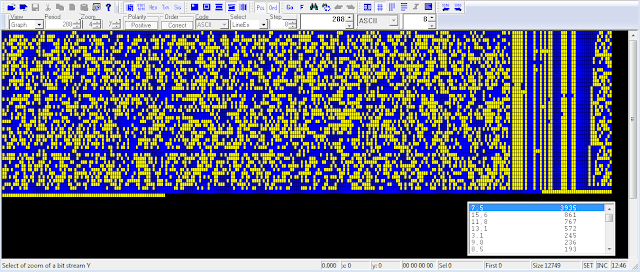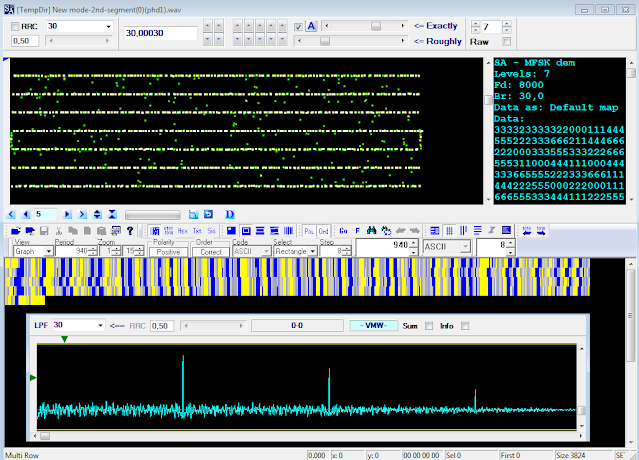updated
Very interesting "mixed-mode" transmission cathced and sent me by by friend Michel (F1GOC)
 |
| Fig. 1 |
Segment 1 consists of an FSK modulation keyed at 200 Baud and 1000 Hz shift (Figure 2). The demodulated bitstream has a well defined period of 288 bit consisting of a data segment preceded/followed by a sync/probe sequence (Figure 3).
 |
| Fig. 2 |
 |
| Fig. 3 |
Segment 2 consists of an MFSK-7 modulation keyed at 30 Baud and 400 Hz separation between the tones. The raw demodulation of the seven tones (0-6;000-110) shows a repeated sequence of 940 bit length (Figures 4,5).
 |
| Fig. 4 |
 |
| Fig. 5 |
Segment 3 is the most interesting one. This segment consists of 7 subcarriers which coincide with the tones of the previous MFSK segment (see Figure 1), the modulation used for each subcarrier - in my opinion - seems to be ASK2/OOK. The "aggregate" speed of modulation is 200 Baud, ie 28.5 Baud per channel (Figure 6). The autocorrelation function of the signal shows a period of 10 seconds, corresponding to 2000 bit frames (Figure 7).
 |
| Fig. 6 |
 |
| Fig. 7 |
As a simple curiosity, the central frequency of the FSK segment does not coincide with the value of the center band of the following two segments (see Figure 1). Difficult to state the user and the purpose of the transmission, many "experimental" signals are in the air especially during this period, comments are welcome.
------- update --------------------------------------------------------
As my friend cryptomaster commented (and my friend Nicola too in pvt), the FSK segment is the well-known Russian Intel "F06" waveform. Indeed, after the change of the bit-order is possible to clearly see the typical F06 32-bit sync sequence 7D12B0E6 (Figure 8). The final part of the decoding, thanks to the rivet_b90 tool, is shown below (Figure 9).
And... yes, I'm a bit out of shape since the 288-bit period should have suggested the solution 😁
 |
| Fig .8 - F06 sync sequence |
 |
| Fig. 9 - F06 decoding |




